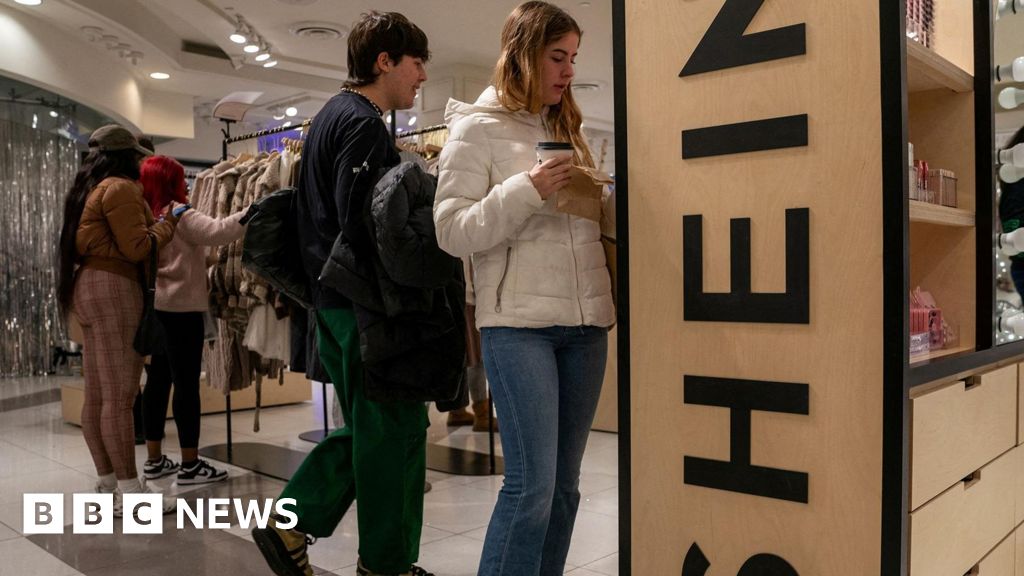Shein should come to London, says former B&Q boss

Fast fashion firm Shein should be allowed to list on the London Stock Exchange despite controversy over its green credentials and taxation, the former boss of B&Q has said.
Sir Ian Cheshire, who was also the former chairman of Barclays, said it would be better for the company to list in the UK as London-listed firms have to meet certain environmental quality controls.
The alternative could be Shein listing on another exchange, which “might just let them do what they want”, he told the BBC’s Today programme.
Sir Ian’s comments come after Superdry boss Julian Dunkerton said Shein was being allowed to “dodge tax” and was a “complete environmental disaster”.
On Tuesday, Mr Dunkerton said the fast fashion giant had an unfair advantage because import duties are not charged on the low-value parcels it sends direct to customers from overseas.
“We’re allowing somebody to come in and be a tax avoider, essentially,” the Superdry boss said.
Shein, which was founded in China but has relocated to Singapore, has been laying the groundwork for a potential sale of shares on the stock market, prompting closer scrutiny of its practices.
Its formula of offering a wide range of cheap clothes – backed up with campaigns on Instagram, TikTok and other social media – has turned it into one of the biggest fashion retailers in the world.
The firm filed initial documents for a London listing earlier this year.
This was after a potential New York listing came under fire from both Democrat and Republican politicians, who were concerned over the company’s “deep ties to the People’s Republic of China”.
Shein has also been accused of using forced labour in parts of its supply chains, which it denies. It previously told the BBC it has a “zero tolerance for forced labour”.
Sir Ian told the BBC on Wednesday that Shein being listed in London could mean the UK could influence the firm.
He said the London Stock Exchange had a “good set of controls and quality requirements”, adding companies “can’t just show up and be accepted with open arms”.
“I would always vote for companies coming to London to be on the responsible side of the [green] transition and moving in the right direction,” Sir Ian said, adding that another stock exchange “might just let them do what they want”.
Sir Ian said there were “lots of difficult decisions and nuances” when assessing companies for their environmental impact, such as oil and gas firms.
In response to critics arguing that Shein had an unfair advantage on import charges, Sir Ian said that large numbers of UK clothing retailers bring in clothes from China, Bangladesh, and India, for example, and pay duties on large containers.
Shipments worth less than £135 sent directly to UK shoppers do not currently face import duties, but firms bringing in larger consignments do.
He said if there was a “mismatch” where small packages do not pay import duty, the government should look at it.
He added the rules were set up like that “because it was too difficult to track every parcel back in the day”, but “now we’ve go the technology”.
“If you think that’s a problem, then the government can fix it,” he suggested.
On Tuesday, Mr Dunkerton also said Shein was a “complete environmental disaster”.
“Personally, I would force them into paying import duty, VAT and possibly even an environmental tax,” he told the BBC.
Shein has previously said it complies fully with all its UK tax liabilities.
The firm has been contacted for comment.
Related
Why investing in women is a vital next step for…
Get Nadine White's Race Report newsletter for a fresh perspective on the week's newsGet our free newsletter from The Independent's Race CorrespondentGet our fre
Business secretary signals major shift on electric car policy to…
In a determined effort to retain Nissan’s manufacturing presence in Britain, Business Secretary Jonathan Reynolds has vowed to implement “substantial c
Joint Statement: Business Secretary and Fujitsu Services Ltd
Business and Trade Secretary Jonathan Reynolds today (Friday 7 March) met chiefs for Fujitsu in Tokyo to begin talks over the cost of redress for victims of th
UK foreign secretary backs multilateral defence funding for Europe
UK foreign secretary David Lammy has said that a new multilateral fund will be needed to secure Europe’s defence as he confirmed that Britain is “open to”













